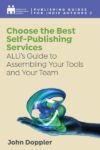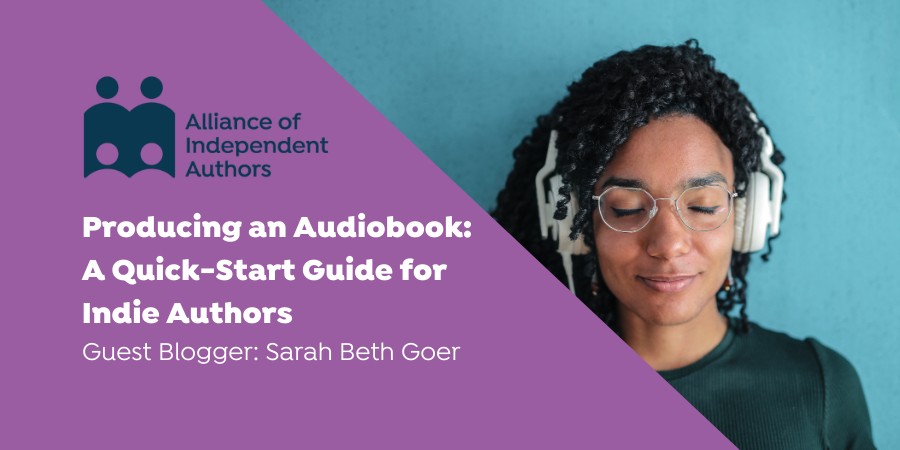
Sarah Beth Goer
Sarah Beth Goer is an audiobook producer and narrator who has worked extensively with both independent authors and major publishers. As a narrator, Sarah’s clients include Harper, Scholastic, Hachette, and Penguin Random House. As a producer, Sarah has worked with multiple bestselling authors. Here, Sarah shares the steps she'd recommend for producing an audiobook.
If you’re considering getting started with audiobook production, there are many wonderful sources that can help teach you how. So many sources, in fact, that the vast quantity of info can be overwhelming.
If you’re looking for one clear source that will help you get going, below you’ll find a big-picture, simplified, step-by-step overview of the audio production process from start to finish.
Step #1: Determine whether audiobooks are a good fit for your business.
Here are a few considerations to help judge if producing audiobooks will suit your work:
- A quick rule of thumb: if the print and ebook made enough in the first month of sales to cover the cost of audio, you'll probably make $ in audio in the long run.
- Bundles tend to do very well in audio, because listeners love spending an audio credit to get two or three books instead of just one. So, if you write in series, that’ll be a boon in audio. I know of several authors who have made the bulk of their audio income via audiobook bundles.
- For most books, audiobooks tend to be more of a long game than a quick return on investment. But if that fits your sales and writing plans, keep reading.
For a variety of reasons, it's very difficult to predict the royalties you'll make per audiobook sale. This can be affected by the length and genre of your audiobook, to which storefronts you will distribute, and the fact that many audiobook customers purchase using credits rather than paying list price.
However, just to give you some idea of the possibilities, let’s look at what you might expect to make per audiobook on Audible.com:
- Exclusive: Very roughly around $4 average per sale if you are exclusive to Audible/Amazon/iTunes and you do not split your royalties with any other party (such as your narrator, your publisher, etc.).
- Non-Exclusive: Very roughly around $2 average per sale if you are non-exclusive and you do not split your royalties with any other party.
Step #2: Decide how you will produce your audiobook: selling your rights, hiring a producer, or managing audio yourself?
Selling your rights
- Means that you sell your audio rights to your book to a company or individual interested in acquiring them. They will then manage the production process for your audiobook/s.
- This is typically for 7-to-10 years, and in exchange, you receive a split of royalties and sometimes also a small advance.
- Best for those who do not want to invest any upfront time or money into audio, and do not mind earning lower royalties in exchange.
VITAL TO KNOW!
When you sell your rights, remember that you will receive a percent of a percent of the royalties. For example, if a publishing company offers you 20% royalties, they mean 20% of what they take in.
So, let's say they're going to be earning the industry standard of 35% to 40% on Audible/Amazon. That means that if you're offered 20% from the publishing company, you'll be making 20% of 35 to 40%. AKA, you’ll be making about 7% to 8% royalties on Audible/Amazon. This compares to the 40% you'd make if you independently distributed exclusively to Audible/Amazon, or 25% if you chose to distribute non-exclusively.
Hiring a producer
- Suits those looking to keep your rights and have the support of an experienced guide to take care of every aspect of audio production for you.
- Best for those who would like to make the highest royalties possible and have budget upfront to invest into audio production.
- Also suited to those who don’t have time and/or skill to manage the process themselves.
Managing audio yourself
- Good for those who want to oversee all aspects of production.
- Best for those who would like to make the highest royalties possible and would prefer to save some money by investing their own time managing the production process (as opposed to paying to hire a producer).
- Takes skill and time, so consider carefully if you can produce an audiobook to a professional standard yourself.
If you choose to sell your rights, you can stop reading now, as you will be advised by the rights owner if and how you can be involved in the process.
For those who choose to keep your rights, the next steps are…

Photo by Jonathan Farber on Unsplash
Step #3: If you have chosen to work with a producer, find your producer and hire them now.
- Good ways to find a producer include asking your colleagues for recommendations, or approaching one of the many known production companies in the industry.
- If you’re interested in working with a producer, you can read more about that process on ALLi’s guide: How to Work with an Audiobook Producer.
Your producer will guide you through the rest of the production steps and/or do many of these steps for you, so if you’re hiring a producer you can skip straight to Step #8.
But… if you have opted to manage your own production, here are the next steps for what to expect.
Step #4 (self-managed production): Decide what type of production you need: single narrator, dual narration, or duet narration.
- Single Narrator: Typically, if your book has one first-person POV or if the book is in third person, you'll hire one narrator. If you've got multiple first-person POVs, you'll hire a narrator for each distinct POV. That said, hiring multiple narrators is becoming more popular for third person as well (especially for romance in which you're alternating between the romantic leads' third-person-limited POVs), so that's also an option.
- Dual Narration: Means each narrator performs their own chapter. For example, if your book alternates between Alex and Morgan's POVs, one narrator reads all of Alex's chapters, and one narrator reads all of Morgan's chapters. If you’re going to go this route and you’re managing audio yourself, it’s typically easiest to either hire a team who works together frequently or hire one narrator who will then subcontract to another narrator, rather than hiring two narrators separately and then expecting them to coordinate the project. There’s a lot that goes on behind the scenes to manage a production, so if neither narrator is officially in charge, you may run into challenges.
- Duet Production: Means you've got narrators reading individual lines of dialogue within each chapter. For example, if you wrote a romance between Alex and Morgan, the narrator playing Alex would perform all of Alex's dialogue, and the narrator playing Morgan would perform all of Morgan's dialogue. It's less common but becoming more popular. It's also more expensive to produce, because both the narration and the post-production are more complicated to coordinate and more time-consuming, and thus the cost rises. If you’re going to go this route, be sure to hire someone who’s experienced in managing duet productions!
Step #5 (self-managed production): Choose what type of deal you’ll offer to your narrators: royalty share or per-finished-hour.
Royalty Share
- Means you pay either a small amount up front (sometimes called a “hybrid deal”) or nothing upfront in exchange for paying your narrator(s) a share of your audiobook royalties.
- Royalty Share makes it less expensive to get an audiobook made. On the other hand, you'll recoup more slowly. Also, you’re risking making less in the long run if your audiobook does well.
- It can be harder (though definitely not impossible) to find an excellent narrator who's available to work for royalty share… unless your book’s sales numbers are so awesome that you probably wouldn't want to be offering a royalty share deal in the first place!
- With royalty share, you'll typically need to work with a single narrator (no dual or duet narration). It'll be much harder (though not impossible) to find narrators who are willing to split royalties among themselves.
- Be careful about series! If you produce a title via royalty share, you'll lock yourself into sharing profits on any audiobook bundles that title appears in unless you buy out your narrator(s) first.
Per Finished Hour (PFH)
- Means you pay a one-time fee based on the length of the finished audiobook. You keep all your royalties.
- A good way to estimate the Per Finished Hour cost of your book is to take your word count, divide by 9300, and then multiply by the Per Finished Hour rate. For example, let's say your book is 60,000 words and your narrator charges $400 Per Finished Hour. 60,000 divided by 9300 is about 6.5. So your final audiobook will be (roughly!) 6.5 hours long. Multiply the estimated time (6.5) by the rate ($400 PFH) to get a total estimated cost of $2600.
- For a full-time professional narrator, expect to pay a minimum of $250 Per Finished Hour (this is the ACX.com minimum rate for SAG-AFTRA union members). Up to about $400 to $450 PFH is quite common. Some narrators charge less, and some charge more.
Step #6 (self-managed production): Find and hire your narrator(s).
Many indie authors audition folks on ACX.com, ask other authors or publishers for recommendations, or approach narrators they like directly. Some top tips for the process are:
- Most pro narrators have their own websites and will happily negotiate with you to narrate your book (assuming they're interested and available, of course). So, if there’s a narrator you love listening to whom you’d think would be perfect for your title, go ahead and ask!
- Be sure to communicate in advance with prospective narrators if your book contains content that will require certain skills (for example, accents or dialects), or content that might not be a good fit for some people (for example, political, sexual, or violent content).
- Make sure you and your narrator(s) are on the same page about what your money will cover – particularly who will handle what during post-production. Some narrators take care of everything on their end, while others expect you to manage some or all elements of post-production on your end. Also discuss series needs if this is relevant to your books.
- Always do what you can to vet your narrator to minimize your chances of hiring someone unreliable or inexperienced. How can you do this?
- Referrals from other authors can help ensure you find someone who has a proven track record.
- Ask three or four specific questions before you hire anyone to gauge their all-important communication skills. Are they friendly? Prompt? Thorough? Trust your gut here.
- Don’t be afraid to ask for references if you feel that would be helpful. It’s not a standard ask in this industry, but it’s certainly something a well-qualified narrator should be able to provide if you’d like them to
Step #7 (self-managed production): Oversee the production process.
- Some narrators will provide a short sample of the project’s narration for your approval prior to diving into the full recording. Communicate with your narrator regarding what to expect around this.
- After feeding back on the initial narration sample, there is not much for you to do during the production process unless problems arise.
- After production officially begins, you can expect narrators to accommodate proof-listening changes (that is, corrections if the words of the audio accidentally differ from the words of the text), but more substantial changes (such as tone, pacing, character voices) will be much more difficult to change. And, depending on the scope of the changes requested, may incur further cost to the production or may not be doable. If you encounter problems and you have opted to manage your own production, it will be your job to troubleshoot. If you’ve hired a producer, then it would be the producer’s job, and this is one bonus of taking that route.
- After production is complete, your narrator will deliver your files in .mp3 format via the delivery method you have agreed upon. Two common delivery methods are:
- As a direct upload to ACX.com.
- Via a file transfer service so that you will receive the files directly and upload them to the platform(s) of your choosing.
Step #8: Select which distribution platform/s you will use.
Regardless of how you have approached production, with you or a producer managing the process, you’ll want to look across all the platforms available yourself to decide which ones are right for you. Here are a few pointers to get your started:
ACX.com
- Distributes to Audible, Amazon, and iTunes (Apple).
- If you're exclusive to ACX, you'll earn 40% royalties. If you're not exclusive (which is only an option on ACX if do a per-finished-hour production as opposed to a royalty share production), you'll earn 25%.
- Access to ACX.com is available in the US, Canada, Ireland, and the UK only
- If you like, you can start out exclusive and switch to non-exclusive after 90 days. However, you can only make the change once per title.
Findaway (and other similar platforms)
- Distribute, well… pretty much everywhere.
- Even if you decide to go non-exclusive, if you're in a country that can access ACX, you'll likely want to upload to ACX first for Audible/Amazon and then go to your second platform, such as Findaway, for everything else. This is because this way you’ll receive the max non-exclusive royalty rate on Audible/Amazon (25%) rather than the percent of a percent you’d earn by reaching Audible/Amazon through a different distributor (typically 80% of 25%, AKA 20%).
Kobo
- Kobo allows direct uploads, so consider uploading directly to Kobo as well.
Audiobooks Unleashed
- A great distribution option if you need to do a non-standard royalty share split. For example, Audiobook Unleashed can accommodate you if you want to split royalties among multiple authors or multiple narrators, or if you want to pay your narrator a certain amount of royalties up front before your royalty split begins. Basically, anything you want to do with royalties, Audiobooks Unleashed will do it for you.
Step #9: Submit your finished audio to your preferred distribution platform(s).
Assuming your files pass quality control, your audiobook will typically go live at most stores within 10 business days. However, delays can sometimes occur, especially during November/December!
There are a handful of retail stores that can sometimes take up to 30 days or longer.
Remember: You will need to obtain square cover art for your audiobook to distribute it. Most cover artists will already know how to meet audiobook cover specifications, but if you need help, your distributor can provide guidelines as well.
Step #10: Market your audiobook.
Marketing could of course be a whole guide itself, and if you are looking for information to build a complete plan, why not take a look at the ALLi article: Audiobook Marketing For Indie Authors. In the meantime, here are some quick tips.
- If possible, consider simultaneous or near-simultaneous ebook/audiobook publishing, because the push from your print/ebook launch will affect your audiobook sales as well.
- Ahead of launch, consider getting your audience involved via a narrator reveal, audio sample reveal, or updates throughout the production process.
- Once live, make sure your print and ebook readers know the audiobook exists! Put links to your audiobooks in your email newsletter and front/back-matter of the ebook, as well as in your print book. A QR code works well here. Don’t forget your universal book links.
- Add a line to your book description on all storefronts that says, “now in audio!”
- Post on social media to promote the launch – videos, moving images and audio clips tend to do better on social media than static images.
- Build reviews as quickly as possible. You can use promotional codes from your distributor to garner reviews, turn to your newsletter subscribers or to audiobook Facebook groups to find reviewers, or consider sites such as freeaudiobookcodes.com or audiobooksunleashed.com for Verified Reviewer option.
I hope this guide has been helpful! Wishing you the very best on your audiobook journey.
Sarah is an audiobook producer and narrator. You can find out more about Sarah on her website, where you can click on the ‘contact' tab to get in touch with her directly.
Find out more
 If you are considering bringing in suppliers to help with your audiobook production, or for any service along your self-publishing career, take a look at Choose the Best Self-Publishing Services, ALLi's guide to assembling your tools and your team.
If you are considering bringing in suppliers to help with your audiobook production, or for any service along your self-publishing career, take a look at Choose the Best Self-Publishing Services, ALLi's guide to assembling your tools and your team.
This book is available from the ALLi Bookstore. ALLi members enjoy free access as part of their membership.





n the midst of producing an audiobook, the seamless integration of PayFast caught my eye.
Thanks so much for adding additional information, Joanna! I’ve been following you for quite some time and am a fan of your work.
I do have thoughts I’d like to add about AI. I’m biased, of course, since I am a human narrator, but I believe it’s important to make a well-thought-out, informed decision when it comes to producing AI audiobooks. Here are three points I’d invite authors to consider:
· A human-narrated audiobook is not only a product, it is also a work of art that offers listeners a deeper connection to humanity. An AI audiobook is just a product. That may or may not pertain to any particular author’s business choices, but I think it’s worth noting. For those who’d like to see this point illustrated, this video does so clearly: https://www.facebook.com/reel/744898980792213
· While AI audiobooks save production money up front, it’s possible they could hurt an author’s business in the long run. If listeners decide they don’t want AI audio, then authors will miss out on a portion of the potential market who may not buy at all, or who may buy just the one audiobook and never come back.
· It’s possible AI audiobooks are a short-sighted decision that will ultimately benefit large companies more than it will benefit authors. Driving down the cost of audio production means corporations will be able to drive down the retail price of audiobooks, which in turn means authors will have far less audio income potential.
Ultimately, each author needs to make the decision that is best for themselves, but I do suggest that the decision to produce AI audiobooks be made with a keen awareness of context and potential consequence.
Thanks so much for this article — it is packed with useful info — but it’s not complete in terms of options for indie authors, so here are a few extra things that might be useful.
For non-fiction/memoir/short stories or other books if you want to upskill, narrating the audiobook yourself can cut down costs and bond you with listeners who get to hear the voice of the author. I took some voice training for this and it has been a worthwhile investment. I have my own audio booth at home (wooden frame with sound blankets), and with tools like Audacity / Amadeus Pro / Hindenburg Narrator, I can record, edit, and master my own files.
For distribution, selling direct audio is by the far the most profitable way, given the dampening effect of streaming on audio income.
Indie authors can do Kickstarter or other crowdfunding options, or use Shopify/WooCommerce or other direct sales options. We can use Bookfunnel.com to host and distribute the files through their excellent app.
To sell direct, you can still use ACX and FindawayVoices, just make sure to choose the Non-Exclusive contract.
AI narration and production is also an option for authors selling direct and wide. Options include Google Play Books, Eleven Labs, Deep Zen, and more.
Audiobooks are a fantastic way to reach more readers with your books. As an audio-first consumer, I want more indie authors to have their books in audio!
Thanks, Jo
Joanna Penn, The Creative Penn, author of Audio for Authors